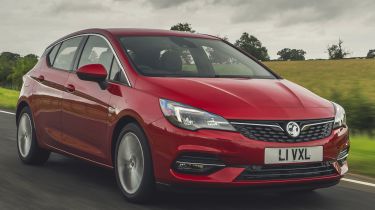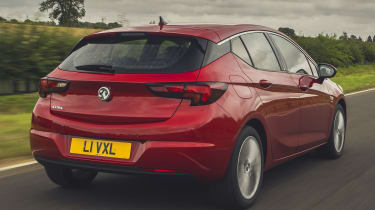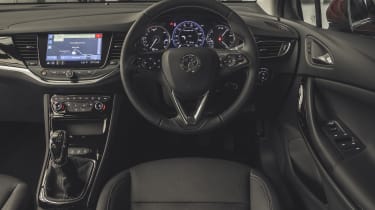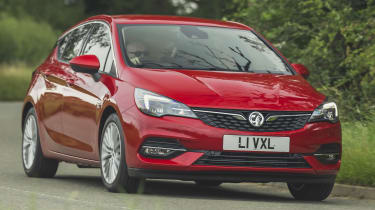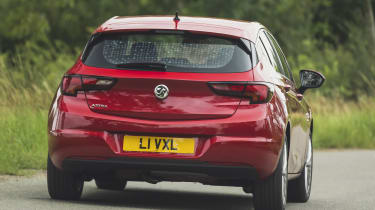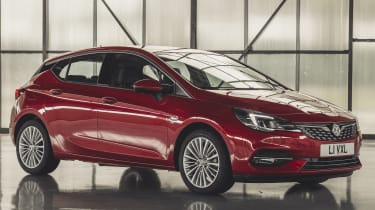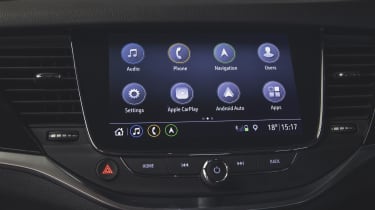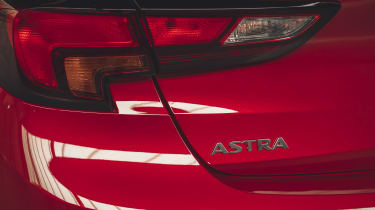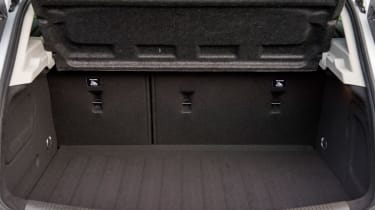New Vauxhall Astra 2015 review
First drive on UK roads proves new Astra delivers on its looks and is set to be a real class contender

This latest-generation Astra is a tremendous car that – for once – puts Vauxhall up against the very best in the small family hatchback class. The newcomer drives superbly, with a firm, yet comfortable ride plus an impressive and efficient diesel engine. There’s plenty of cabin space, quality, hi-tech equipment and style. So, can it climb to the top of a hugely competitive class? We’ll let you know soon when we get the chance to test it head-to- head against key rivals – but it stands a very good chance.
Vauxhall says that over a quarter of all UK drivers have either owned or driven an Astra – and with former owners among the Auto Express team, we can well believe it. But the model has never really deserved its place as one of the nation’s favourites – it’s been a triumph of sales and marketing over ability. The last version, for example, looked great but its drive didn’t deliver.
Things are about to change, though, and this latest Mk7 Astra is a car that, at last, is genuinely deserving of the attention it’ll receive. Is it a class leader? We’ll wait until we put it head-to-head with our current champ, the Leon, in a couple of weeks to find out, but what we will say now is that it’ll give the SEAT a good run for its money.
Let’s begin with the same angle most automotive makers start with these days – weight loss. This new model is up to 200kg lighter than the lardy Mk6 it replaces, which makes a huge difference to the way it feels from the moment you pull away.
Used - available now

2023 Vauxhall
Astra
8,711 milesAutomaticPetrol1.2L
Cash £18,900
2021 Vauxhall
Astra
29,275 milesManualPetrol1.2L
Cash £10,706
2019 Vauxhall
Astra
52,700 milesManualDiesel1.6L
Cash £8,400
2023 Vauxhall
Astra
11,857 milesManualPetrol1.2L
Cash £18,300• Vauxhall Astra's not flagging at 36 years and counting
And Vauxhall has managed to pull off an even more clever trick with the new car: it’s physically smaller than the old model, but boasts more room inside – and in many cases, it’s cheaper to buy, too. It’s got technology that rivals don’t yet offer (clever matrix beam LED headlights and Apple’s CarPlay, for example). And it’s British – built in Ellesmere Port in Cheshire, fine-tuned on British roads and designed by a team led by Brit Mark Adams.
These days, Vauxhall is keen to be seen as an equal to Opel in Europe, so our first drive of the new car was in the UK in right-hand-drive, Vauxhall-badged models – that’s not been the case previously. As a result, you can trust us when we say the new Astra glides nicely over the UK’s unique road surfaces. There’s still a firm edge to the ride quality, but it’s communicative rather than unforgiving, rounding off the sharper edges of the nastiest bumps and potholes. You’ll know they’re still there, but you won’t complain as you go over them.
Previous Vauxhall owners will also be relieved to know that the better-looking specification levels (SRi and above) no longer come with a penalising chassis setting. Instead, every Astra gets the same hardware with the exception of wheel size, while a Sport button tweaks only the steering and throttle settings.
There are MacPherson struts at the front, and a novel torsion-beam rear axle with a clever Watt’s link at the back – Vauxhall has chosen not to go with an independent multi-link rear set-up, claiming that its chosen route is better for the ride/handling/packaging equation. And having ridden extensively in both the front and the back, we’d say this is a fine decision.
• Vauxhall Astra GSi spotted testing
Grip levels are good, and although the electrically assisted power-steering doesn’t offer the finest feedback in the world, its linear operation is better than in the prototypes we experienced earlier this year. In fact, GM’s chassis chief admitted that feedback from early UK drives helped him get the steering set-up he preferred.
Of course, there is seemingly no end of advanced systems at play: cornering brake control, torque vectoring by braking, cornering torque control, electronic drag torque control and brake assist with hydraulic brake assist fade, to name a few. Let’s not bother with what each does individually, save to say that the model now rides and handles really nicely – and we can’t remember stating that about an Astra before.
We drove two versions of the newcomer: the new 1.4-litre turbo petrol with 148bhp, and the car we’ll concentrate on here, the 1.6-litre 134bhp ‘whisper’ diesel set to be the best seller. There are two other whisperers as well, with 109bhp and 158bhp – and the lower-powered version claims an incredible 91mpg and 82g/km of CO2. A further pair of petrols are a three-cylinder 1.0 turbo, which has already impressed us in the Corsa and Adam, plus a 197bhp 1.6 Turbo, which is about as hot as the Astra will get until GSi and VXR models arrive.
Let’s be honest, it was a bit of a risk referring to any diesel as ‘whisper’, but the Astra’s engine is surprisingly refined. There’s a bassy rumble, rather than a higher-pitched clatter, which is actually quite pleasant… when you can hear it (and you’ll be hard pushed, especially on the motorway). Response is pretty swift, too; the 134bhp engine claims 0-62mph in 9.0 seconds – seven-tenths down on the old car – thanks in no small part to the new Astra’s weight-loss programme. That also helps with the 103g/km and 72.4mpg claims.
We’ll leave you to judge whether or not the Astra is drop-dead gorgeous, but what we would say is that it looks even better in the metal. At that point you can better appreciate the sharp creases along the sides, delicate flick to the window line behind the rear door, and clever detailing as the lines of the headlights flow into the grille. These are all difficult things to do in production, but their presence is a sign of how well the car is built at Ellesmere Port.
Inside is another tremendous Vauxhall interior, which features a much more interesting design than rivals’. The dash is dominated by a seven or eight-inch IntelliLink touchscreen that’s easier to navigate than those on some premium-brand offerings.
The screen sits in a piano-black surround that stretches all the way across, underlined by a slither of chrome-effect trim. There are only six, well positioned buttons, with most controls on the touchscreen. Air-con and climate control are looked after further down the centre stack, while an electronic parking brake is available on SRi models and standard on top-spec Elite; Design, Tech Line and Energy trims complete the line-up in that order of plushness.
Another screen sits between the rev counter and the speedo. Bizarrely, though, the latter goes up in increments of 20mph, missing out on the crucial 30mph and 70mph markers.
There are soft-touch materials where you need them, while the driving position is good, with easy access and plenty of adjustment. The rear features a lot of space for adults, with 35mm more kneeroom than in the previous car and plenty of headroom in spite of the sloping, coupé-like roofline. Again, access to the back is good.
Boot space is the same as in the old car, at 370 litres, and there’s a handy ribbed floor to stop things moving. If you go for a space-saver spare, the boot floor will be totally flat with the rear seats folded. Otherwise, there’s a bit of a step at the base of their base.
Our £21,480 SRi costs £930 less than the old equivalent, yet it comes with extra kit including the Auto Express award-winning OnStar system with 4G Wi-Fi hotspot and eight-inch touchscreen with Apple CarPlay or Android Auto. The matrix beam LED headlights, which dim full beam only in an area where it might dazzle someone, are an extra £995, and are difficult to justify unless you’re a real tech fan. They take a split-second too long to react, and the full-beam spread could do with being wider.

